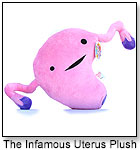
February 9, 2026


| “I love having my own business...I wouldn't trade it for the world.” — Wendy Bryan, Creator, I Heart Guts |
 A. I have always loved bizarre toys. When I was a teenager I decorated my car with glow-in-the-dark millipedes, plastic nuns and rubber goldfish, so in retrospect, toy-making does seem like the right fit for me. But I spent a decade in graphic design before I started making stuffed internal organs.
A. I have always loved bizarre toys. When I was a teenager I decorated my car with glow-in-the-dark millipedes, plastic nuns and rubber goldfish, so in retrospect, toy-making does seem like the right fit for me. But I spent a decade in graphic design before I started making stuffed internal organs. A. We've had a few gut-wrenching setbacks over the years. Our first big challenge was getting our plushes tested and compliant with CPSIA regulations, which became mandatory just after we'd made a batch of plush. We got them tested and, ironically enough, they were all kid-safe except for the uterus. We were mortified and had to recall the product, but everyone thought the "uterus recall" was so funny that we actually got a lot of press and many new customers discovered us this way. Another recent unpleasantry included an import problem — one of our shipping containers was accidentally picked up before US Customs completed all of its exams. That landed us with a $14,000 fine, which we were able to bring down to $2,500, but only after hiring an expensive lawyer. Lesson learned: make sure your broker and freight forwarder are awesome.
A. We've had a few gut-wrenching setbacks over the years. Our first big challenge was getting our plushes tested and compliant with CPSIA regulations, which became mandatory just after we'd made a batch of plush. We got them tested and, ironically enough, they were all kid-safe except for the uterus. We were mortified and had to recall the product, but everyone thought the "uterus recall" was so funny that we actually got a lot of press and many new customers discovered us this way. Another recent unpleasantry included an import problem — one of our shipping containers was accidentally picked up before US Customs completed all of its exams. That landed us with a $14,000 fine, which we were able to bring down to $2,500, but only after hiring an expensive lawyer. Lesson learned: make sure your broker and freight forwarder are awesome. A. We are lucky that people like the guts enough to share their love via word-of-mouth. Our products have struck a nerve among enough small communities (diabetics love the pancreas, smart people like brains and what OB/GYN wouldn't love a stuffed uterus?) that all together add up to strong sales overall. Kids love us, but so do doctors, nurses, medical students, etc.
A. We are lucky that people like the guts enough to share their love via word-of-mouth. Our products have struck a nerve among enough small communities (diabetics love the pancreas, smart people like brains and what OB/GYN wouldn't love a stuffed uterus?) that all together add up to strong sales overall. Kids love us, but so do doctors, nurses, medical students, etc.
Copyright © 2026 TDmonthly®, a division of TOYDIRECTORY.com®,
Inc.